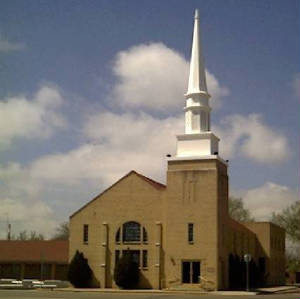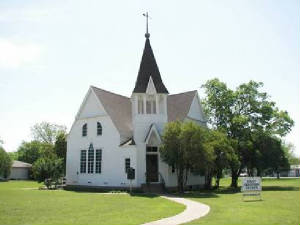|



Christian
Disciples
1804-2009
Our Spiritual Heritage of Unity, Liberty and Diversity
The Evangelical Christian Church in Canada (Christian Disciples) as a mainstream
religion in Canada can be traced to the formal organization of the Christian Church in 1804 in Bourbon County, Kentucky, under
the leadership if Barton Warren Stone (1772-1844), a formal Presbyterian minister. The Stone Movement later merged with the
efforts of Thomas Campbell (1763-1854) and his son Alexander Campbell (1788-1866) to become the Restoration Movement that
gave birth to the Churches of Christ (Non-Instrumental), the Christian Churches and Churches of Christ, and the Christian
Church (Disciples of Christ). The Evangelical Christian Church (Christian Disciples), as a restructured group within the Restoration
Movement tradition, made significant contributions to evangelical Christianity by becoming the Fundamentalist of the 21st
century that has a position that is conservative theologically, and focused throughout Canada and the United States on radical
congregationalism, and traditional Christian Church thinking with an unique contemporary approach.
The Evangelical Christian Church, also known as "Christian Disciples" became
the Stone-Campbell Movement, also called the Restoration Movement, which arose on the frontiers of early nineteenth-century
America. A conglomeration of members from different Christian groups and denominations decided that the church at that time
had gotten away from the foundational truths of Christianity. In 1832, many Methodists, Baptists, Presbyterians, and others
who became followers of the Campbell's group made an effort to unite with Barton Stone's group in Kentucky. When the question
arose as to the name to be adopted, the Campbells perferred the name "Disciples" while Barton Stone's group favored the name
"Christians." As a result, "Christian Disciples" was taken and used, becoming the most powerful movements in American and
Canadian history - and a uniquely world-wide religious body, known as The Evangelical Christian Church (Christian Disciples).
Through the early twentieth century, many Restoration churches, not otherwise
apart of the three larger Restoration bodies existed under such names as the Canadian Evangelical Christian Churches, the
Evangelical Christian Churches, the Christian Churches of North America, the Christian Missionary Churches, the Bible Evangelical
Churches, the Community Churches and the Evangelical Congregational Churches. Some of these came together in 1966 as the Evangelical
Christian Churches, Farmland, Indiana. The majority of these congregations that have not been otherwise absorbed, continue
as the Evangelical Christian Churches, Albany, Indiana.
The Evangelical Christian Church attempts to continue the Restoration tradition
as embodied in its several slogans, "Where the Scriptures speak, we speak. Where the Scriptures are silent, we are silent,"
In essentials, unity. In non-essentials, liberty. In all things, love," We are not the only Christians. We are Christians
only;" and "No creed but Christ. No book but the Bible." It seeks to perpetuate the message first preached by Barton Stone
and his colleagues. This includes an emphasis on the Bible as the all sufficient rule of faith and practice in every area
of the Christian life. It also includes an emphasis on a trinitarian approach to God the Father, God the Son, and God the
Holy Spirit, while considering itself a conservative, non-creedal Christian movement that shares the distinctive view that
the authentic primitive church order is being restored to the whole church in the power of the Holy Spirit.

The Evangelical Christian Church in Canada acknowledges as its Sole Head,
Jesus Christ, Son of God and Saviour. The ECCC is a community of believers who through baptism by faith in Jesus Christ are
bound by covenant to God and to one another. The ECCC draws their inspiration from the truth of scripture and the leading
of the Holy Spirit, celebrating around the Lord's table the life, death and resurrection and continuing presence of Jesus
Christ. It also looks to the presence, power and energy of the Holy Spirit to prosper its creative and redemptive work in
the world without the control of human dictatorship. The basis of this Christian fellowship is found in relationship with
one another in accordance with the teaching of our Lord and practice among evangelical Christians. It recognizes two sacraments,
Baptism and the Lord's supper. Another practice included in the ECC is also the washing of feet as illustrated by the Lord.

Not only are we an interdenominational, ecclesiastical religious
body that reflects a rich variety of theological and sociological perspectives and backgrounds, but the early participants
in this movement consisted, instead, of those who came away from a variety of fundamental, evangelical denominations and religious
groups. They did this, not in an attempt to reform any particular denomination, but rather in an effort to "restore"
the "original" church according to the biblical practices found in the New Testament.
The Campbell movement was characterized by a "systematic and
rational reconstruction" of the early church, in contrast to the Stone movement which was characterized by "radical freedom
and lack of dogma." Despite the differences, the two movements agreed on several crital issues. Both men saw restoring apostolic
Christianity according to a biblical pattern found in the New Testament as a route to Christian Liberty, while stressing Christian
unity and fellowship under God. Barton Stone believed that unity among Christians could be achieved by using apostolic Christianity
as a true model in the interest of peace, love, mercy, and kindness.
All Evangelical Christian Churches are self governing in the
tradition of congregational polity. This movement is not "just another denomination" but a "body of believers" who have agreed
together to love God, love each other, and serve the world. That is why ECC leadership is never static and fixed but is fluid
and dynamic. It is never program-oriented but is people-oriented. It is never building-oriented but a builder of community,
never in control but is able to shift from being leader, to a peer or follower. Leadership is never "qualified" but demonstrates
godly qualities, never one person but multiple persons. It is never an office holder or an officer, but leadership is a servant
among servants of God.
The ECC in Canada encourages diversity when we gather, and desires
discussion with those who agree to disagree. We're distinctly Christian and our love for Jesus is communicated clearly, but
aside of having no creed, we have a specific statement of beliefs that is truly biblical, and we enjoy freedoms that are not
under authoritarian control. We see our role in the body as providing a safe place for those ministers who can't seem to find
their voice in a more traditional setting. This is the right to private judgment, interptretation of scripture, and liberty
of conscience. We will be the first to tell our brothers and sisters that we don't have all the answers, but we are heading
toward deep uncharted waters, traveling where the wind of the Holy Spirit blows, and waiting on the Holy One who is leading
us to adventures yet unknown.
As a result, our ministers come from evangelical, charismatic,
mainline, and post-Christian intercultural backgrounds. The religious and philosophical views represented are equally varied.
This provides occasional tension and awkward moments, but also incredibly rich and beautiful dialog, which stretches us and
causes us to grow in humility and maturity. We embrace one another fully as beautifully flawed, unique individuals in the
family of God who are called to rule and reign with Christ as world changers and history makers within the Kingdom of God
on this earth.

|
